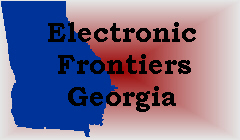

The vast web of electronic media that connects us is heralding a new age of communications. New digital networks offer a tremendous potential to empower individuals in an ever-overpowering world. However, these communications networks are also the subject of significant debate concerning governance and jurisdiction.
For, while the free flow of information is generally a positive thing, serious problems arise when information flows free--problems such as how to protect children and undesiring adults from exposure to sexually explicit or potentially offensive materials; how to protect intellectual property rights; how to determine which country's laws have jurisdiction over a medium that is nowhere and everywhere at the same time; how best to protect privacy while still permitting recovery for harm; how to ensure that legislators, access providers, and network users do not stifle disagreeable speech. While well-established legal principles and cultural norms give structure and coherence to uses of conventional media, the new digital media do not fit so easily into existing frameworks.
Founded in June of 1995, Electronic Frontiers Georgia is dedicated to finding ways to resolve these and other conflicts while ensuring that essential civil liberties are protected.
Electronic Frontiers Georgia was founded in June of 1995 to ensure that the principles embodied in the Constitution and Bill of Rights are protected as new communications technologies emerge. To this end, the EFGA:
EFGA works to make sure that common carriage principles are upheld in the information age. Common carriage principles require that network providers carry all speech, regardless of its controversial content. EFGA supports a new common carriage system in which system operators are shielded from liability for the actions of users, but without the regulatory burden presently associated with common carriage.
EFGA also works to convince lawmakers that all measures that support broader public access to information should be enacted into law. EFGA supports an Electronic Freedom of Information Act and other legislation to make government information more accessible to citizens.
EFGA supports both legal and technical means to enhance privacy in communications. We, therefore, advocate measures that ensure the public's right to use the most effective encryption technologies available, and have spoken before Georgia lawmakers as well as conducted online campaigns in support of these goals.
EFGA supports an Open Platform model of the global information infrastructure, providing nondiscriminatory access, based on open, private-sector standards, and free from burdensome regulation.
Finally, EFGA works to craft policies that enable public and private information providers to distribute and sell their information products over the Internet. We encourage the government to provide support for schools, universities, and research labs that buy Internet services on the open market. We work on policies that encourage the government to stimulate the development of experimental, precompetitive, network technologies and to fund the development of applications that are of use to "low-end" users, who are traditionally underserved by advanced digital media.
In order to foster community and openness, EFGA works with local organizations that support online communications issues. EFGA, in an advisory ally role, has helped other organizations.
EFGA, in conjunction with many other organizations, has formed and participates in a number of coalitions and summits to bring together thinkers from the nonprofit/NGO world, communications and computing industry leaders, government policy makers (when appropriate), and grassroots advocates in a nonpartisan setting to discuss communications policy goals and strategies and to form balanced solutions to problems. Such efforts to date have included the Digital Signature Working Group, Copyright Enforcement Summit, and our Industry Advisory Council.
EFGA publishes an electronic bulletin, EFGA-Online.
EFGA maintains several communications forums on the Internet. We have our own Internet node which houses our FTP, gopher, Listserv and WWW information servers.
Finally, EFGA answers Internet and civil liberties questions from the community via telephone, postal mail and e-mail whether they be technical ("How do I connect to the Internet?") or legal ("Does my boss have the right to read my e-mail?"). We have built up a strong reputation among "netizens" for being an excellent source of information about life in Cyberspace.
In 1996, we...
Our agenda for the coming year includes...
Every day decisions are being made that will affect the future of communications:
Electronic Frontiers Georgia works to ensure that the civil liberties guaranteed in the Constitution and the Bill of Rights are applied to new communications technologies. EFGA is a respected voice for the rights of users of online technologies. Become involved. Support EFGA and protect your future rights in the rapidly developing online community.
Electronic Frontiers Georgia is a non profit corporation organized pursuant to the provisions of the Georgia Non Profit Business Code.
The Corporation is a corporation not for profit and is organized for the purpose of general charitable, and civic betterment of the community focusing on educational involvement in the community and its betterment;
(a) To engage in the promotion of development of electronic communication networks and skills for the betterment of communities and such services related thereto;
(b) To engage in any lawful business or activity related thereto;
(c) To engage in any other lawful business or activity for which corporations may be organized under The Georgia Non Profit Business Corporation Code.
(d) The Corporation shall take no act inconsistent with the requirements of Section 501(c)(3) or similar section of the Internal Revenue Code as amended from time to time under which tax exempt status is granted provided exempt status is in effect at the time of any particular considered action.
The IRS has not yet granted 501(c)(3) status to Electronic Frontiers Georgia.
Electronic Frontiers Georgia
Suite A-205
4780 Ashford Dunwoody Road
Atlanta, GA 30338
Internet:
efga@efga.org
HB1630 |
Telecom | DigSig |
IP |
Happenings | Links
Membership |
Mail list | Newsletter
|
Meeting |
About